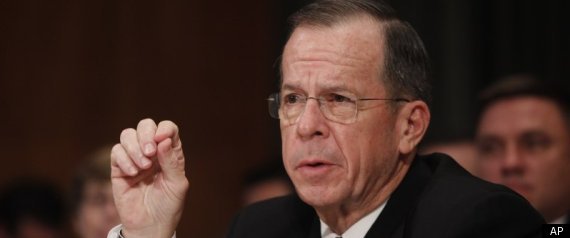Now we have the Chairman of the Joint Chiefs, Admiral Mike Mullen, weighing in calling the Obama plan "Risky." Looks like we are not the only ones questioning the Obama plan from his speech last night. When a President doesn't listen to the Chairman of the Joint Chiefs and the Commander on the ground, it shows an arrogance of someone who never served in the military knowing more than our top Commanders. Putting politics ahead of our men in the military should never happen but Obama jumping in his reelection campaign early is driving a lot of decisions it seem as he plays to his base who wants the United States out of Afghanistan at all costs.
Mike Mullen: Obama Afghanistan Troop Withdrawal Plan Risky

By ROBERT BURNS 06/23/11 10:59 AM ET (AP)
WASHINGTON -- The U.S. military's top officer told Congress on Thursday that President Barack Obama's decision to withdraw up to 33,000 troops from Afghanistan by next summer is riskier than he originally was prepared to endorse.
Navy Adm. Mike Mullen, chairman of the Joint Chiefs of Staff, told a House hearing that he supports the president's plans. But Mullen said they are "more aggressive and incur more risk" than he had considered prudent.
"More force for more time is, without doubt, the safer course," Mullen said. "But that does not necessarily make it the best course. Only the president, in the end, can really determine the acceptable level of risk we must take. I believe he has done so."
Obama announced Wednesday evening that the U.S. and its allies had achieved enough in Afghanistan to merit a drawdown of forces beginning this summer. Obama said 10,000 troops would come home by the end of this year, to be followed by as many as 23,000 next summer. That will leave about 68,000 U.S. troops there.
Mullen, who is retiring Oct. 1, was blunt in testifying about the risks and potential rewards of Obama's decision.
"No commander ever wants to sacrifice fighting power in the middle of a war," Mullen said.
"And no decision to demand that sacrifice is ever without risk. This is particularly true in a counterinsurgency, where success is achieved not solely by technological prowess or conventional superiority, but by the wit and the wisdom of our people as they pursue terrorists and engage the local populace on a daily basis. In a counterinsurgency, firepower is manpower."
On the other hand, Mullen said, taking the safer course would have entailed other kinds of risks, such as increasing the Afghan government's dependence on the U.S.
Excerpt: Read more at Huffington Post AOL News






No comments:
Post a Comment